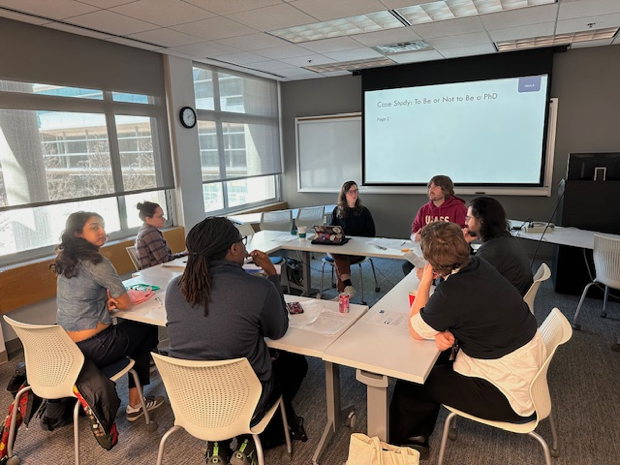CCN and DIBS Entering Mentoring Workshop Series – Spring 2024
The Entering Mentoring Workshop is a professional development series facilitated by Duke graduate students affiliated with the Center for Cognitive Neuroscience and Duke Institute for Brain Sciences. The workshop is adapted from the Entering Mentoring Series developed by the University of Wisconsin (CIMER) and focuses on teaching effective mentorship techniques. The series, which consists of four 2-hour sessions over four weeks, is tailored for SoM graduate students and postdoctoral fellows who are starting to mentor or seeking to improve their mentorship skills. Throughout each session, the program aims to provide tools to help mentors set and communicate expectations with mentees, choose feasible projects, provide constructive feedback, and mitigate or resolve conflict. To help consolidate the series content, sessions include guided discussions, exercises, and practice scenarios. School of Medicine graduate student participants earn four Responsible Conduct of Research (RCR) credits (1 per session) that count towards satisfying RCR requirements in their respective program curriculum.
Graduate students, Deborah Cesarini and Evan Hare co-facilitated the Spring ’24 Entering Mentoring Program, which recently concluded.

Deborah Cesarini, CNAP Graduate Student, Psychology & Neuroscience was part of the Spring ‘23 Entering Mentoring cohort. Her mentor-mentee relationships have greatly benefited from the resources shared in the series. Since 2021, Deborah has been a research mentor at the Cognitive Neuroscience Research Internship (CNRI). Overall, she has over 2 years of experience helping undergraduate students develop their own research projects and collaborate in ongoing studies. By continuing the tradition of recruiting previous Entering Mentoring Workshop attendees to serve as future co-facilitators, the series will continue to maintain knowledgeable and prepared co-facilitators that are best equipped to foster mentoring growth in our community.
Evan Hare, Graduate Student, Psychology & Neuroscience has been in a teaching assistantship position for 7 semesters and has personally mentored over 5 undergraduate students during their research laboratory training. He has extensive experience on both sides of the mentor-mentee relationship from several universities and fields within neuroscience. He has been a mentor for over 3 years and has helped several undergraduate students grow academically. During his time at Duke, he has taken graduate courses in teaching pedagogy and has been interested in how to best incorporate active and team-based learning into undergraduate-level psychology and neuroscience courses.
Below are testimonials from prior Workshop participants which highlight the importance and need for these types of programs:
“This workshop provided structure and guidance to help me shape my mentoring outlook. I was happy to feel that it sparked conversations in me about who I want to be as a mentor, and how I want to express that to my mentees.”
“I appreciated all the resources I was introduced to in this workshop, and all the exercises are very helpful for me to figure out how to move forward with my mentees and make sure they succeed in their projects. This gave me different perspectives into what I should consider when mentoring, including communication styles, fostering independence, addressing issues or differences, etc. These are some things I hadn't thought about too deeply before, but that I can see would have a big impact on whether a mentorship is successful.”
“This workshop packaged together multiple mentoring resources into one cohesive curriculum. Each week, we engaged in active learning to immediately apply what we'd learned. I was able to put into words the various mentorship-related challenges and phenomenon I've encountered, such as how conflict can be created by differing communication styles. In my own mentorship, I've already implemented the communication style quiz and formally set expectation using resources I got in this course.”
“I feel that the workshop contributed to my ability to search for concrete tools for things I otherwise would not have thought to look for e.g. questionnaires for assessing communication styles, tools for structuring research goals, etc. I also feel it benefited me a great deal to hear other people talk about their mentoring experience (and ‘menteeship’ experience) in contrast to my own to better value these tools even if for my specific style they are not necessary.”

The Duke Institute for Brain Sciences has sponsored the Entering Mentoring, DUNE and CNRI programs since their inception (2019-2021). These programs, all inspired, created and led by our graduate students and postdoctoral fellows, are not only to serve the community but also provide the neuroscience graduate student body with multiple didactic and experiential opportunities to develop their mentorship portfolio.
Applications for Entering Mentoring Spring ’25 Workshop will open in January 2025. Look out for future announcements.